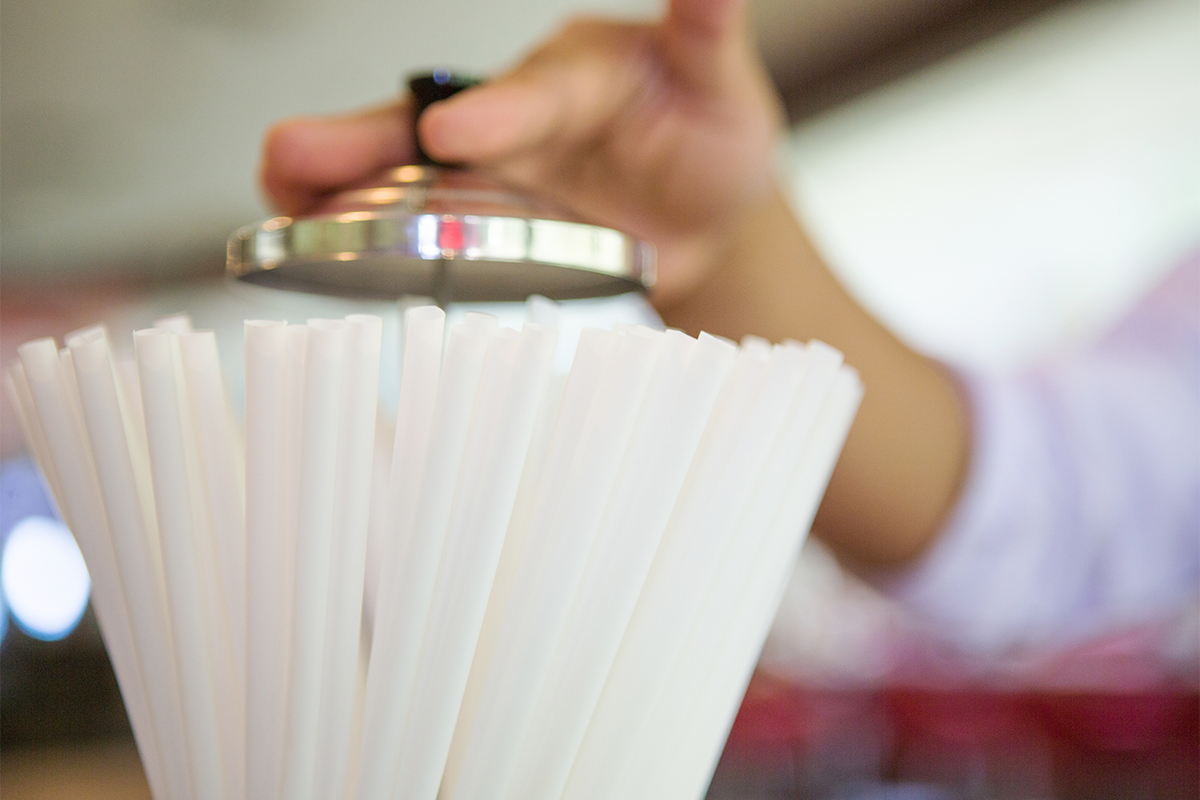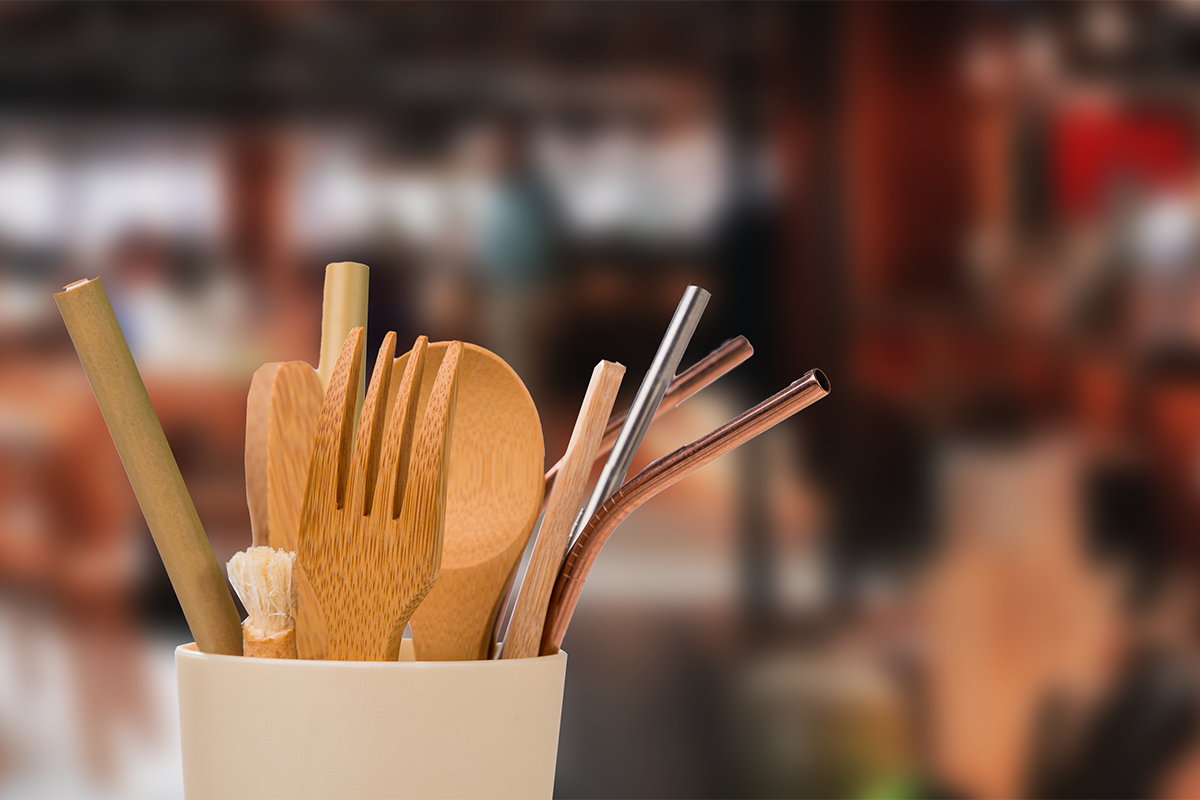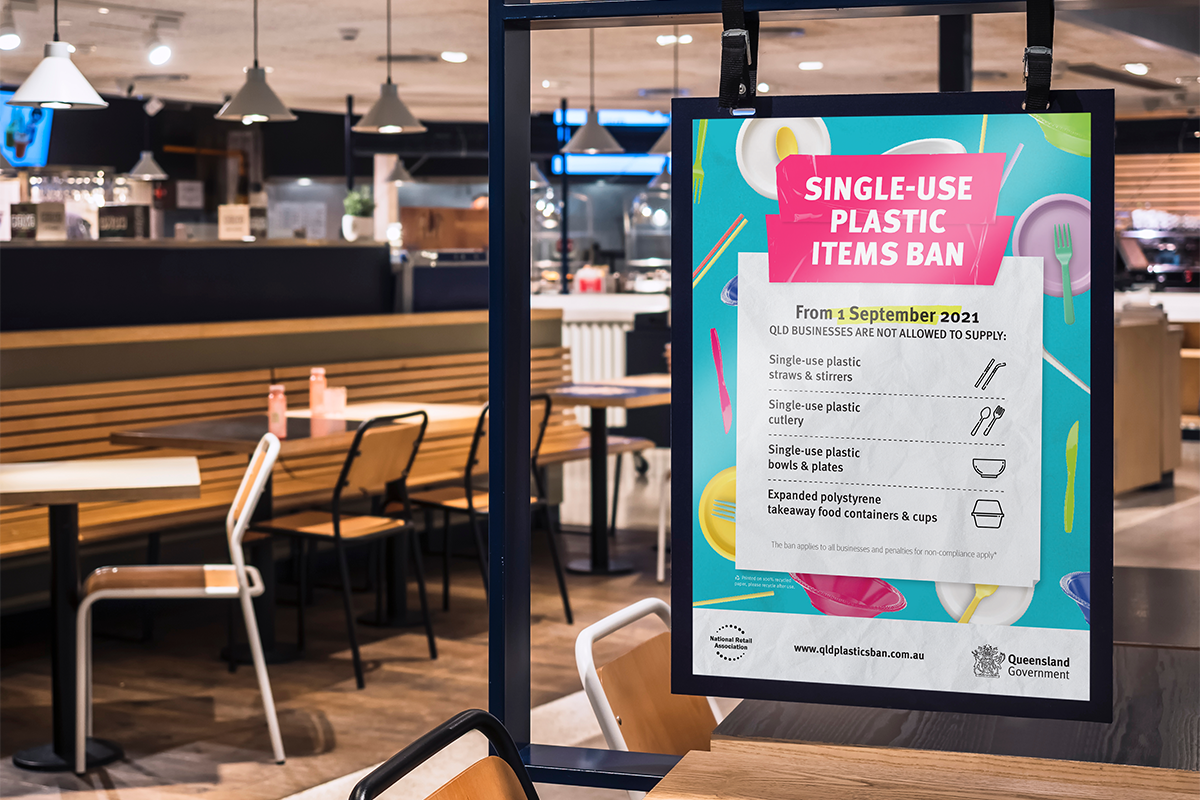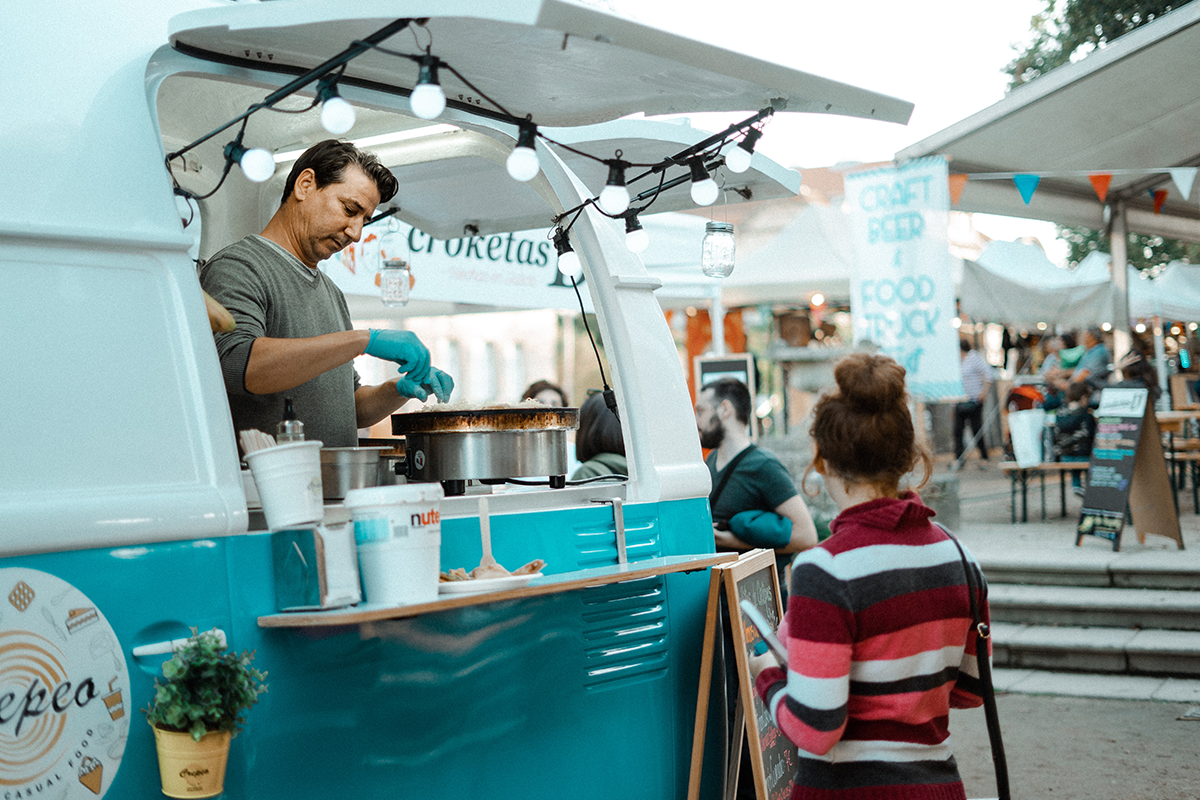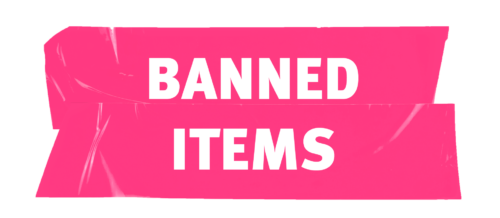
From businesses in Queensland are no longer able to supply:
* some exemptions apply
BANNED 1 SEPTEMBER 2023
PLASTIC SHOPPING BAGS
Plastic shopping bags are defined as:
- bags with handles AND
- used to carry goods from a business or organisation.
This includes shopping bags made from fossil-fuel based or compostable plastic film.
The ban does not apply to:
- bags without handles eg. produce bags, dry-cleaning bags, zip-lock bags, freezer bags
- waste bags e.g. bin-liners, nappy bags
- other types of packaging such as bread bags, hot chicken bags.
The new requirements do not apply to bags made of synthetic fabrics, non-woven polypropylene or other materials.
EXISTING REQUIREMENTS
Lightweight plastic shopping bags were banned in QLD in 2018. Any plastic shopping bag must be 35 microns or more in thickness to meet the existing law. View previous regulations >
NEW REQUIREMENTS
From 1 September 2023, shopping bags made from plastic film will need to meet TWO additional requirements to be supplied in QLD:
- Be made from a minimum of 80% recycled content verified by a recognised program or certification
AND - Be durable and big enough to carry 10 kilograms for at least 125 uses verified by a recognised reusability, durability or endurance test.
1. Verify a minimum of 80% recycled content
Suppliers should provide certification from a recognised program or other written evidence which guarantees that the bags supplied are made from a minimum of 80% recycled content.
Examples of programs and certifications (examples only, not endorsement):
For example, the European Standard EN 15343:2007 specifies the procedures needed for the traceability of recycled plastics. In another example, many organisation use the Global Recycling Standard (GRS) standards: Packaging PC0023, Processed post-consumer materials PC0035.
Certificates from reputable testing labs should clearly describe which standard was used for verification, as well as the exact composition and amount of recycled content.
2. Verify reusability for a minimum of 125 uses
Businesses should ask manufacturers to supply evidence that the bags have passed 125 cycles carrying 10kg of weight.
The recommended method is to use an accredited facility to perform tests to a recognised testing standard, such as EN 13590 or ECP CCD 100.
Example test: The Dynamic Test (or ‘jog’ or ‘jolt’ test)
-
- EN 13590: Machine simulates a sharp drop and rise of a bag filled with 10kg of weight for 125 cycles.
- ECP CCD 100: Machine simulates the jolting motion of a person jogging with a bag filled with 10kg of weight for 125 cycles. Based on the requirements of the Californian Bill.
These testing standards are already used internationally and provide detailed instructions to enable consistent testing of durability and reusability.
Reusability tests must be performed on the finished shopping bag, not just the plastic film, as reusability and durability are often impacted by factors beyond thickness, such as handle design and seam strength.
Testing labs
As most plastic film bags are made outside Australia, most accredited testing labs are based overseas closer to manufacturing hubs. This is not dissimilar to labs for Australian composting certification as these are also based overseas.
- Many labs already test shopping bags to the Californian Bill which mirrors tests above - see list of labs here (note: list is external and not endorsed)
- Others test to the European standard e.g. www.tuv.com, www.ugra.ch, www.innoform-testservice.de, www.ri.se.
(Please note these links are external information for reference only and we do not endorse any organisation listed.)
Inhouse testing
Alternatively, businesses may choose to provide written evidence of inhouse testing which follows the methods required by these standards.
However the Queensland Government may request accredited testing or further proof (at the businesses’ expense) to ensure results are accurate.
Labelling on the bag is not required.
Businesses may wish to voluntarily use labelling to help customers to better use, clean, reuse, recycle and dispose of your bag, but you should ensure all claims are accurate and verified.
Labelling or claims are NOT proof of compliance, and businesses should avoid false or misleading claims which are offences under the Waste Reduction and Recycling Act 2011, as well as greenwashing offences under Australian Consumer Law.
The Government does not issue official certification or endorsement of any bag.
Though degradable additives are not yet banned in QLD, we recommend checking that the bag does not contain degradable additives as these additives cause the bag to break into microplastics over time and are not biodegradable.
These additives are being phased out across Australia.
First, consider if you need to supply a shopping bag for every purchase. If most customers only buy a few items, they may not need a bag at all. Customers should also be encouraged to bring their own reusable bags. You could also reuse stock boxes to avoid waste.
Then, if you do need to supply shopping bags, consider what type of bag is the most sustainable option for your business based on your product type and size, and if customers are likely to reuse the bag.
Examples:
- DISPOSABLE: If you supply takeaway food or drink, the bag is likely to be contaminated during use and it is unlikely to be reused long-term, so the best option may be sustainably-sourced paper.
- REUSABLE: If you supply fashion, electronics, grocery items or other goods, the best option may be charging for a well-designed durable bag made from fabric, jute or plastic that meets the new requirements.
We encourage businesses to implement strategies to encourage people to bring their own bags (such as bag fees, discounts or loyalty points). This helps to reduce consumption and encourage reusable behaviour.
Compostable plastic shopping bags are allowed if they:
- are wholly made from compostable plastic which has achieved Australian composting certification (either AS5810 or AS4736)
- are greater than 35 microns in thickness; and
- pass reusability tests carrying 10kg for 125 uses.
Certified compostable shopping bags do not need to pass the recycled content requirement unless the bag includes some non-compostable plastic. The non-compostable plastic component must have a minimum of 80% recycled content.
Evidence now shows that the most sustainable bag is the one that is reused the greatest number of times.
- Switching to a disposable option like paper is less harmful as litter, but can increase carbon impacts and continued single-use behaviour fails to reduce the volume of natural resources consumed.
- Fabric bags like cotton and polyester can contribute to resource depletion and are currently difficult to recycle.
- Plastic bags can be the most sustainable option when they are reused and recycled many times as part of a circular economy.
Ultimately, not using a bag at all or reusing a bag for hundreds of times are the most sustainable choices.
EPS LOOSE-FILL PACKAGING
Takeaway food or drink packaging made from expanded polystyrene (EPS) was already banned in QLD in 2021.
From 1 September 2023, loose-fill packaging (such as ball or peanut shape pieces) made from expanded polystyrene (EPS) is banned in Queensland.
The 2023 ban does not apply to:
- EPS trays used for meat, seafood or fresh produce
- EPS that is part of a product and not used as packaging (e.g. EPS beanbag fill, craft products)
- EPS packaging which is moulded, or used as a sheet or film (however please note these types of EPS packaging are being considered for future QLD bans and are being phased out nationally over the next few years).
- loose-fill packaging which is not made from expanded polystyrene.
Businesses should inform their product manufacturers that products supplied in QLD must NOT contain any loose-fill packaging made from expanded polystyrene (EPS).
We note all forms of EPS packaging are being considered for phase out across Australia as it is difficult to recycle and problematic in the environment. See Federal EPS Roadmap >
We also note that some jurisdictions are phasing out other forms of expanded plastic beyond EPS. Information on other bans >
Alternatives
First, consider whether you need to use any loose-fill packaging within your product range if the product is not fragile.
If you do need protective packaging, there are a wide range of alternatives available, such as recycled paper, pulp, wool fill, textiles, or air pillows.
PLASTIC COTTON BUDS
Most manufacturers have phased out disposable cotton buds with plastic stems as they are problematic to the environment.
From 1 September 2023, cotton buds with plastic stems are banned in Queensland.
The ban does not apply to:
- Plastic cotton buds used for scientific, medical or forensic uses (such as antigen tests or first aid kits).
You can use cotton buds with stems made from paper, wood or bamboo or purchase reusable stems with replaceable buds.
PLASTIC MICROBEADS
Most manufacturers have already phased out plastic microbeads in personal care and cleaning products in line with the voluntary industry code, BeadRecede, which has successfully proven over 99% compliance.
From 1 September 2023, plastic microbeads in rinse-off personal care and cleaning products are banned in Queensland.
The ban does not apply to:
- products that are not designed to be rinsed off or removed with water immediately or shortly after application (e.g. deodorant, makeup)
- plastic products that are not defined as microbeads (such as craft glitter).
Consider using reusable scrubbing brushes, loofahs or other exfoliants.
Non‑plastic products, such as those containing salt, sugar or pumice grounds are available and provide similar functions of abrasion and exfoliation.
BALLOON RELEASES
Balloons are problematic in the environment and damaging to wildlife when they escape or are released into the air, whether accidentally or on purpose.
From 1 September 2023, the release of a lighter-than-air balloon is banned in Queensland.
The ban applies to:
- any person who causes/permits the release/escape of a lighter-than-air balloon into the environment.
Important: the sale, supply or use of balloons is not banned.
There are no obligations or restrictions on the sale of balloons, but we encourage retailers to remind customers of the ban on releases.
Customers, businesses, event organisers, charities and other organisations should ensure balloons are secured or choose alternatives, such as paper confetti or bubbles.
ITEMS ALREADY BANNED
BANNED 1 SEPTEMBER 2021
- The ban applies to single-use plastic straws, stirrers, swizzle sticks, forks, spoons, knives, sporks, splayds, chopsticks and food picks.
- The ban does not apply to serving utensils like tongs, or items included in shelf-ready, pre-packaged food and beverage goods (eg. straw attached to juice box).
Firstly, consider if you need to keep supplying these items as many customers may not need them. Then look at reusable items made from metal or glass.
If you need a disposable alternative, consider sustainably-sourced paper, wood or bamboo. Single-use alternatives which contain compostable plastics must meet Australian Standards.
BANNED 1 SEPTEMBER 2021
- The ban applies to: unenclosed single-use plastic bowls or plates, including those made from expanded polystyrene.
- The ban does not apply to: servingware, bowls and containers with lids, bowls or plates in shelf-ready pre-packaged food and beverage goods (e.g. bowl in frozen meal), or other takeaway containers (e.g. sushi containers, triangle sandwich containers).
Firstly consider reusable plates and bowls made from metal or ceramic or dishwasher-safe reusable plastic items.
If you need a disposable alternative, consider sustainably-sourced paper, sugarcane pulp (bagasse), wood or bamboo. Single-use alternatives which contain compostable plastics must meet Australian Standards.
BANNED 1 SEPTEMBER 2021
- The ban applies to single-use takeaway food containers and cups made from expanded polystyrene (EPS).
- The ban does not apply to EPS trays (e.g. trays used for raw meat, fruit or vegetables), EPS business-to-business transport containers, or EPS in shelf-ready pre-packaged goods.
First consider reusable containers or cups made from glass, metal, ceramic, or reusable plastic.
If you need a disposable alternative, consider sustainably-sourced paper, sugarcane pulp (bagasse), wood or bamboo. You can use other forms of plastic packaging if it is not expanded polystyrene and is not impacted by other QLD bans.

